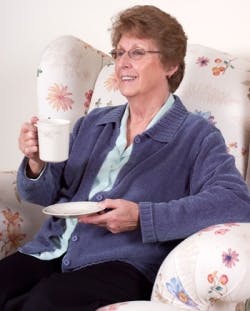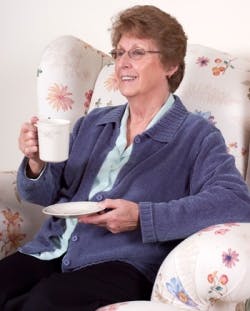Life after clinical hygiene
The ‘R’ word leads hygienist to a weekly coffee hour with seniors
by Diane Chandler, RDH
You can say what you want about change — good or bad. One thing is certain; change happens. In the process, we want to remain whole and feel good about ourselves. While working as a dental hygienist for over 25 years, the changes in technology, techniques, and the patients advanced rapidly. The awareness of dental hygiene as it relates to other wellness issues has been well documented. When I was in the office, I felt very connected and up-to-date with all the new products and procedures. I felt good about myself and my chosen profession.
Then came the “R” day! The doctor decided it was time to retire and to leave the practice whole with a newThis was my starting point. So I decided to reassess my options. I thought it was time to retire. I still loved dental hygiene and especially the contact with patients. I wanted to continue those two passions, but I was not completely sure how I could accomplish this. After making the hard choice, I set out to explore new ventures.
Volunteering and becoming a patient advocate were options. I felt with my cumulative knowledge I could also be a resource person. To this end, I joined a community senior center. They had excellent exercise and art classes that were of interest to me. Before long, everyone in the center knew I was a dental hygienist, and I became a resource person for some who had questions regarding their teeth, or the teeth of their children and grandchildren. The questions were varied and covered such issues as teeth whitening to assisting an arthritic person on brushing his or her teeth.
Eventually, I was hosting a weekly coffee hour and was sitting around chatting about teeth. When I asked an 87-year-old woman who was very interested in whitening her teeth why she did not ask her dental hygienist these questions, she said, “She is so young, about 24 or 25, and I did not want to appear foolish to her.” That convinced me that many more seniors may have similar hesitations so I decided to take some action.
As a resource person, I asked the new doctor in the old practice if I could use some of the office samples and literature to help answer some of the questions. It was a good marketing tool for him as well. This aspect has continued to grow, so I contacted the manufacturer to see if they could provide additional material, particularly information about interproximal cleaning aids. They were supportive and did accommodate my request. Now I have the ability to provide visual examples for the seniors to take with them when purchasing the product.
I cannot believe the variety of questions that are being asked. I think by having a casual setting and sipping coffee in a nonthreatening atmosphere facilitates people’s willingness to open up and ask the questions they think may sound “stupid” in a professional setting.
Some have followed through with the dentistry they needed, and some are still thinking about it. There are those who still abide by the practice of seeking help only when they are desperately in pain. However, they still come and listen to the discussions about teeth at my coffee hour. Maybe they will begin to view dentistry differently and for the first time in their life may not be so fearful. They eventually may be converted to preventative care.
So, the big question is whether I will go back to a formal setting to practice in the profession that I love — I do not honestly know. All I can say now is that I really feel connected to my profession in a whole new way. It confirms my belief that there is truly life after clinical practice.
Past RDH Issues

